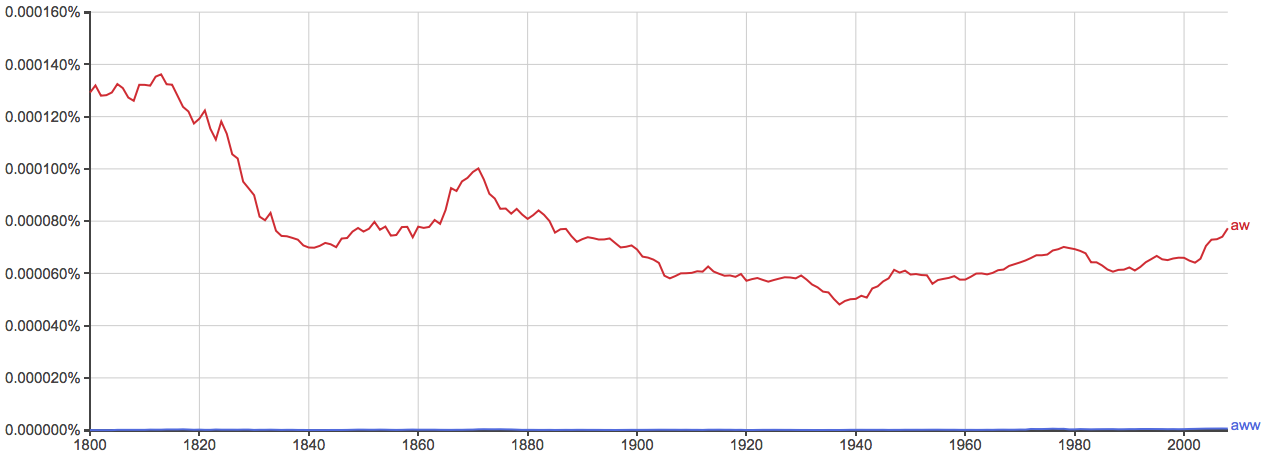If you aren’t sure whether to use aww or awe, you aren’t alone.
These words are homophones, which means they are pronounced alike even though they have separate meanings. Even their spellings are only one letter apart.
Still, these words cannot be substituted for each other. One can function as multiple parts of speech, while the other is a phonetic representation of an almost physiological human response to many different emotions.
What is the Difference Between Aww and Awe?
In this post, I will compare aww vs. awe. I will use each word in various example sentences to demonstrate its use in appropriate contexts.
I will even go so far as to show you a memory tool that will help you remember when to use each of these words.
When to Use Awe
 What does awe mean? Awe is a noun that means wonder or amazement. A person might look in awe at a beautiful sunset, for instance, or at an elegant example of mid-century modern architecture.
What does awe mean? Awe is a noun that means wonder or amazement. A person might look in awe at a beautiful sunset, for instance, or at an elegant example of mid-century modern architecture.
Witnessing a terrible calamity can inspire awe, or a person might feel awe during a religious ritual.
Here are a few more examples,
- Hailey never experienced awe until she listened to Beethoven for the first time.
- Aiden watched in awe as his teacher excoriated Colten for his reprehensible behavior.
- It is a point worth keeping in mind, as Apple’s fiscal second-quarter results from late Tuesday once again leave investors awe-struck at its ability to pad its coffers. –The Wall Street Journal
Awe is one of the components of the adjective awestruck, which means experiencing awe, and the hyphenated compound awe-inspiring, which describes something that causes people to experience awe.
Awe can also be a verb, where it means to inspire wonder or amazement.
For example,
- The Grand Canyon regularly awes visitors with its stunning vistas and sheer cliffs.
- The performer awed the crowd with acrobatic feats and adept showmanship.
When to Use Aww
 What does aww mean? Aww could be considered an overly enthusiastic spelling of aw, which is an exclamation of pity, adulation, or annoyance. One might say aw when playing with a cute puppy, or when commiserating with a friend who has dropped an ice cream cone.
What does aww mean? Aww could be considered an overly enthusiastic spelling of aw, which is an exclamation of pity, adulation, or annoyance. One might say aw when playing with a cute puppy, or when commiserating with a friend who has dropped an ice cream cone.
For example,
- “Aw, poor baby, it looks like you will have to clean your room yourself like a grown-up,” said Chad’s mother.
- “Aw, look at the tiny puppy trying to carry the great big stick!” said Jessica.
- Met — with his wide, perpetual grin; his aw-shucks demeanor; and a noggin that would never fit on the 7 train — hardly seems like a native New Yorker. –The New York Times
Aw is an onomatopoeia of the sound many humans make when experiencing these situations. It can be applied to a wide variety of contexts, most of which are outside formal writing.
When this word is written out, it appears as aw many times more than it does aww.
The below graph charts aw vs. awe in written books since 1800, and, as you can see, aw is clearly the preferred spelling.

Aww is a spelling reminiscent of social media comments where someone might say, “Awwwwww, how cute is that?”
This, of course, is not something you would publish in edited prose.
Trick to Remember the Difference
Now, let’s go over a trick to remember awe vs. aww.
- Awe can be a noun or a verb; in both uses, it refers to a feeling of wonder or amazement.
- Aw is an expression of bare, undisguised emotion, though often not particularly intense emotion.
Since the words awe and amazement each contain the letter E, you should have little difficulty remembering when to use awe instead of aww.
Summary
Is it aww or awe? In the vast majority of cases, aw is used over aww. That said, aw and awe are different words with different uses.
- Aw is an expression of mild but honest emotion, like pity, annoyance, or adulation.
- Awe is sometimes a noun that means amazement or wonder, and sometimes a verb that means to engender feelings of amazement or wonder.
- They are never interchangeable.
To conclude, use aw when writing about a cute puppy or a boring chore, but use awe for inspirational feelings of amazement.
Contents
